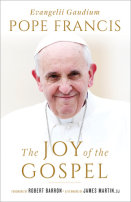Pope Offers Fresh Look at Evangelism
 First off, you should know that I'm not Catholic. I'm rather decidedly a Protestant.
But like lots of folks, religious and not, I'm intrigued by Pope Francis. I wanted to read The Joy of the Gospel for no other reason than to hear his take on evangelism and the world.
First off, you should know that I'm not Catholic. I'm rather decidedly a Protestant.
But like lots of folks, religious and not, I'm intrigued by Pope Francis. I wanted to read The Joy of the Gospel for no other reason than to hear his take on evangelism and the world.
Overview:
The book is an apostolic exhortation from the leader of the Catholic Church to clergy and laity. In it, he tackles the position of the church in the world, the crises it faces, and the hope it offers.
Why you might like The Joy of the Gospel:
While the pope is addressing Catholics primarily, he quickly casts a wide net. On the first page of text, he implores "all Christians, everywhere, to a renewed personal encounter with Jesus Christ ..."
For any mainline Protestants, Francis' take on the problems facing the church will sound tragically familiar.
But Francis is hopeful and articulate. He displays his knowledge of the world as well as the church, and he offers a vision of what the church could bring to the world.
The book is pastoral in tone and obviously comes from the heart of a man who knows the struggles of the parish priest as well as the politics of the Vatican.
He is the strongest of advocates for the poor, not just as recipients of charity, but as being included in decision-making and in receiving the benefits of redistribution of wealth.
For the most part, he offers solutions to the problems of declining church attendance and the perception that religious people are out of touch. He takes on tasks from the creation of a homily (sermon, for us Protestants) to the creating of a just and peaceful society.
Francis also spends a great deal of time encouraging the faithful to respond to materialism and individualism. Consider this passage:
Many of us try to escape from others and take refuge in the comfort of their privacy or in a small circle of close friends, renouncing the realms of the social aspect of the Gospel. For just as some people want a purely spiritual Christ, without flesh and without the cross, they also want their interpersonal relationships provided by sophisticated equipment, by screens and systems which can be turned on and off on command. Meanwhile, the Gospel tell us constantly to run the risk of face-to-face encounter with others, with their physical presence which challenges us, with their pain and their pleas, with their joy which infects us in our close and continuous interaction. ... The Son of God, by becoming flesh, summoned us to the revolution of tenderness.
The pope doesn't avoid the hard questions — from the role of women in the church and its pro-life stance to relationships with other religions.
This is a meaty book.
Why you might not like The Joy of the Gospel:
The book is decidedly Catholic. It quotes extensively from the Catholic tradition as well as from Scripture. This shouldn't come as a surprise, but it should be noted.
The arguments about the role of women are the least compelling section of the book. While Francis argues that women should be involved in decision-making in the church, he says "the reservation of the priesthood to males ... is not a question open to discussion ..."
The book is full of church jargon. Francis usually defines his terms, but without a theological education behind you, certain sections of the book may be a challenge. There is a subsection titled "Kerygmatic and mystagogical catechesis," for example. Most of the book is accessible, but there are exceptions.
This is a book for the faithful, which should be obvious from the title. While a reader interested in the positions of the Catholic church may find it interesting, other sources would likely be more appealing to the non-religious.
My conclusions:
I found The Joy of the Gospel refreshing and relevant. It is a beautiful picture of what the church could be in the world — a voice for the poor, an authority in the face of violence, a transforming influence in the darkness of addictions, isolation, and fear.
It is both practical and theoretical, encouraging and a swift kick where it's most needed.
If you find yourself frustrated or discouraged with the state of the church — Protestant or Catholic — you will find hope and solutions in this short but weighty book.
Full disclosure: I received a review copy of The Joy of the Gospel from Blogging for Books. I wasn't required to give a positive review. These are my honest opinions.